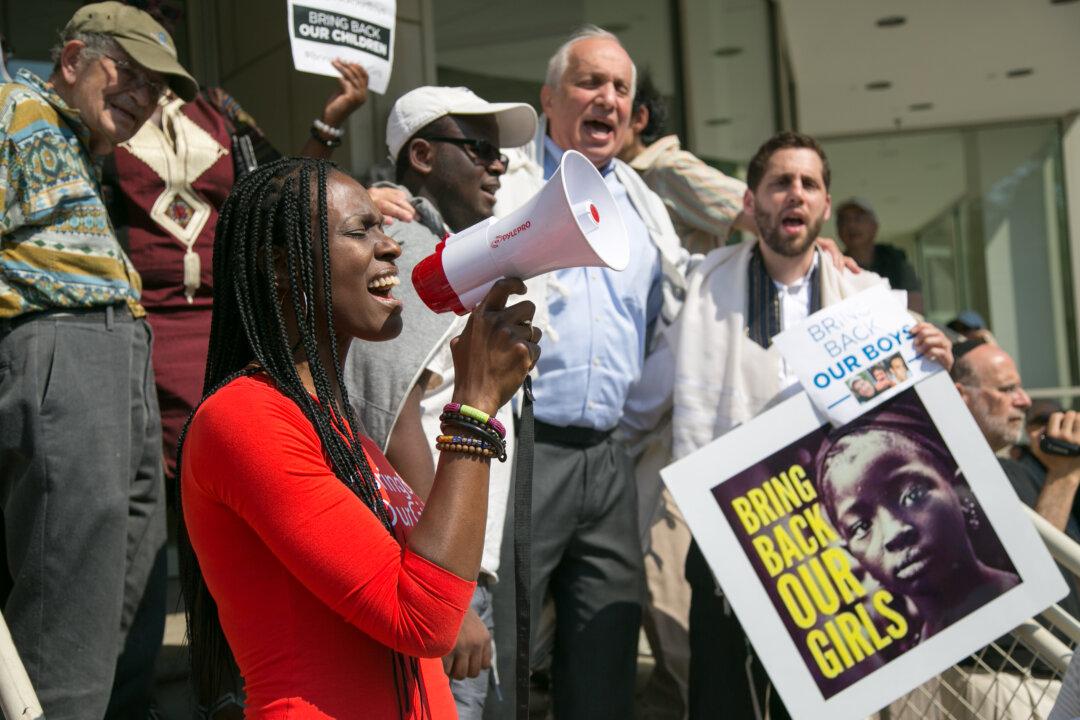NEW YORK—Jewish and Nigerian locals came together in the Bronx Sunday to call for the release of children kidnapped in Israel and Nigeria.
Members of the Riverdale Jewish community and nonprofits focused on African women rights demanded the release of three young man kidnapped in Israel on June 12 and over 200 teenage girls kidnapped in Nigeria on April 15.
Though they were of different skin colors and faiths, the speakers stressed their common goal to “bring our children back.”
On April 15, some 300 teenage schoolgirls were abducted from the Chibok Government Girls Secondary School in northeast Nigeria.
Abubakar Shekau, the leader of Islamist militant group Boko Haram, claimed responsibility for the abduction. The final report on the kidnapping released by the Nigerian government Friday said 276 girls were taken, of which 57 escaped.
Boko Haram, translated as “Western education is forbidden,” have been terrorizing the half-Christian northern Nigeria for the past five years with a goal of carving out an Islamic state. In a video released by the terrorist group after the incident, Shekau said he plans to sell the girls as slaves for $12 each.
On June 12, three boys, Gilad Shaar, 16; Naftali Frenkel, 16; and Eyal Yifrach, 19, were abducted in Gush Etzion settlements, south of Jerusalem in the West Bank. Three days later, Israeli Prime Minister Benjamin Netanyahu put the blame on Hamas, an Islamic terrorist group. Hamas didn’t claim responsibility and the Palestinian government questioned whether the group was responsible.
Different but Same
Last Monday Ruth Evon Idahosa organized a rally under the banner #BringBackOurGirls, a social awareness campaign for the release of the kidnapped girls. While standing in front of the Nigerian Consulate, she was unaware that several blocks away the Riverdale Synagogue rally was sending out its message to #BringBackOurBoys. But circumstances favored collaboration that day.
“They just happen to walk upon our rally,” said Idahosa, who gave up a career as a lawyer to become a women’s rights activist as founder of the Pathways for Justice Initiative. Soon after, Rabbi Ari Hart connected with Idahosa and the idea for a joint rally was born. “Let’s support and strengthen each other in our causes, which are different but also similar,” he said.
Hart thinks the cooperation strengthened their message by showing that “these are not particularistic concerns but this is universal concern.”
“The safety and wellbeing of children transcends faith, color, race, whatever,” Hart said.
The rally called on the governments to do more to free the youth.
Same but Different
Both Nigerian and Israeli governments were criticized for their response to the kidnappings, but for very different reasons.
The Nigerian government has been mainly accused of inaction. According to human rights nonprofit Amnesty International, the government had information that the militants were heading for the village four hours in advance, but failed to react “due to poor resources and a reported fear of engaging with the often better-equipped armed groups.” It took three weeks before Nigerian President Goodluck Jonathan publicly responded to the kidnapping.
On May 26 Nigerian chief of defense staff announced the government knows where the girls are held, but wouldn’t risk using force to take them.
The Israeli government, on the other hand, responded with extensive raids of Hamas infrastructure, arresting hundreds Palestinians in West Bank. The Palestinian government criticized the raids for going overboard. At least three Palestinians were shot dead during the raids.
Terror on the Rise
There have been 2,285 kidnappings in Nigeria in the first four months of 2014, compared to 3,608 in the whole 2013, according to a FiveThirtyEight.com analysis of news reports.
In 2012, Boko Haram was responsible for 364 attacks killing 1,132 people, second only to the Taliban, according to a report sponsored by the U.S. Department of State.
Terrorism itself is on the rise. While in 2004 some 1,600 terrorist attacks were recorded, in 2012 the number rose to over 8,000, according to the Global Terrorism Database.





